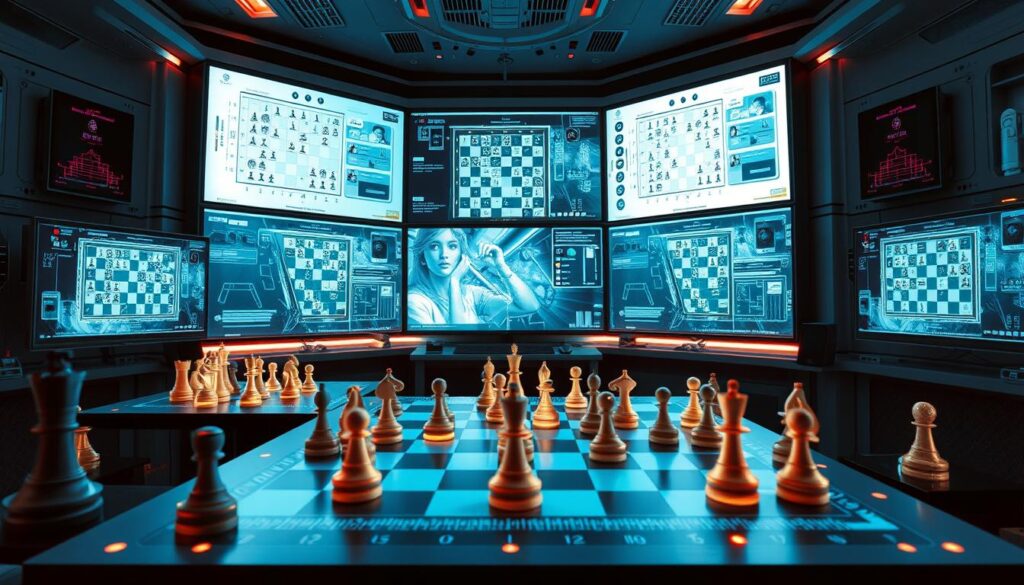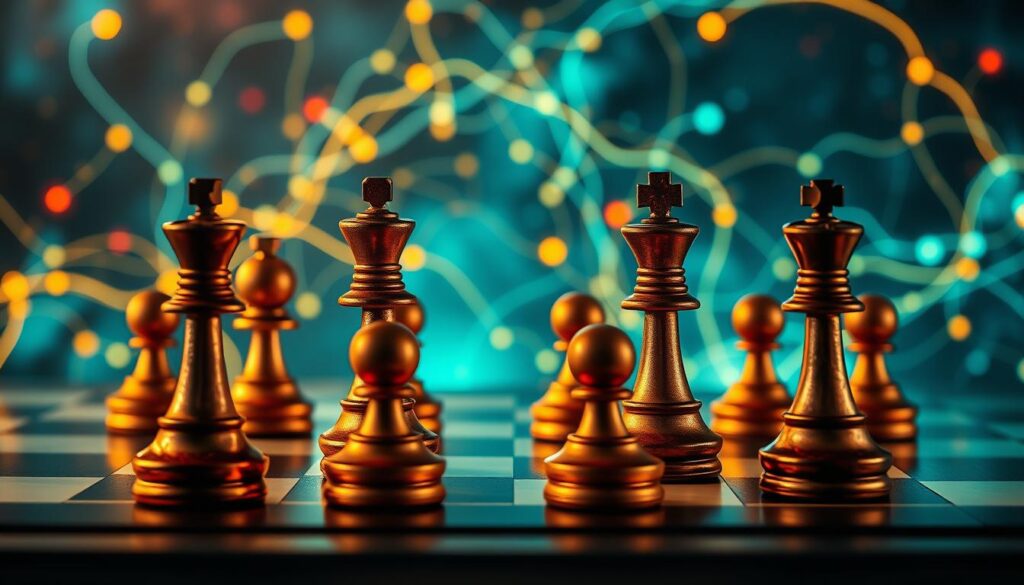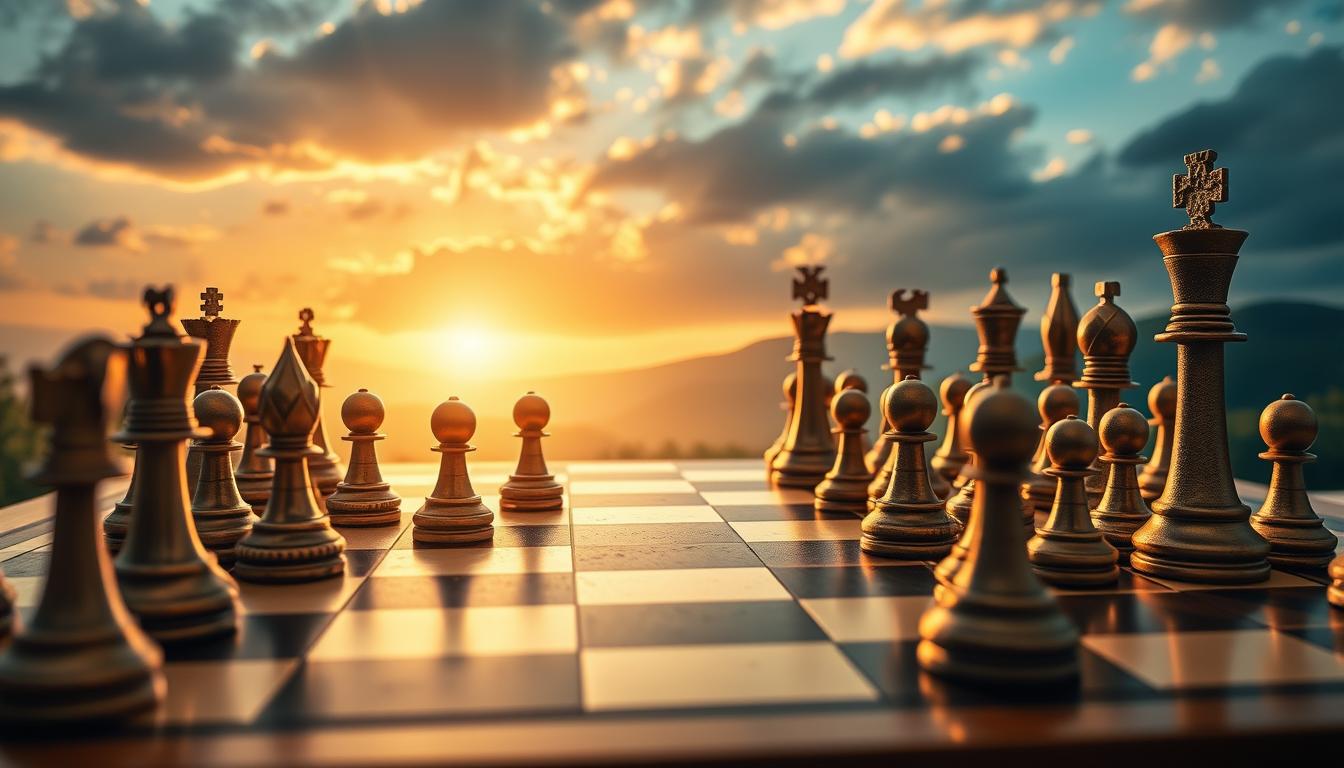Have you ever wondered how to improve at chess? Whether you’re new to the game or have been playing for years, getting better takes time and effort. In this article, we’ll share strategies and techniques to help you become a better chess player.
Imagine you’re facing your opponent, ready to start the game. You’re excited and nervous at the same time. By mastering chess and using the right training methods, you’ll feel more confident and prepared for each game.
Chess is all about strategy. It’s not just about moving pieces or winning. It’s about understanding the game’s deeper aspects. By using tactics like forking and pinning, you can outsmart your opponent. Always think about how your moves will help you achieve your goals.
Table of Contents
Understand the Fundamentals
To get better at chess, start with the basics. Chess is complex, but knowing the rules and strategies is key. Learning the chess rules and chess piece movements is a good first step.
The chessboard has 64 squares, alternating colors. Each square has a letter and number. Knowing the board is crucial for understanding basic chess strategy.
Learn the Rules of Chess
Each chess piece moves differently. For example:
- The knight moves in an “L” shape
- The bishop moves diagonally
- The rook moves horizontally or vertically
- The queen combines the movements of the bishop and rook
- The king can move one square in any direction
- Pawns move forward one square at a time, but capture diagonally
Knowing how each piece moves is key for strategy. Also, understanding the game’s goal—checkmate—is vital. Checkmate happens when the king is attacked and can’t escape.
Understand Basic Chess Strategy
After learning the chess rules, it’s time for basic chess strategy. Key principles include:
- Control the center of the board
- Develop your pieces early
- Castle your king to safety
- Connect your rooks
- Protect your king
Tactics flow from a superior position. – Bobby Fischer, American World Chess Champion
As you get better, you’ll learn more strategies. But, mastering the basics is essential. Even top players focus on building a strong position before using tactics.
Solve Tactical Puzzles Daily
To improve your chess skills, daily tactics practice is key. Tactics are quick moves that can win material or checkmate. Mastering them lets you use your opponent’s mistakes to your advantage.
When solving puzzles, aim to finish 7-10 a day. This keeps your tactical skills sharp. Regular practice boosts your awareness and decision-making, helping players of all levels.
Online tools and apps have many puzzles to practice tactics. Chess.com, for example, has puzzles for all skill levels. Their Custom Puzzles feature lets you choose specific tactics and difficulty levels.
Solving chess puzzles is fun and rewarding. It’s like a mental workout, challenging you to think strategically. Puzzles cover various chess concepts, from checkmates to counterplay, introducing advanced tactics as you progress.
Benefits of Solving Chess Puzzles
Daily puzzle solving has many benefits for your game:
| Benefit | Description |
|---|---|
| Pattern Recognition | Improves spotting familiar patterns on the board |
| Calculation Skills | Enhances thinking several moves ahead |
| Decision-Making | Makes quick decisions in critical positions |
| Creativity | Increases finding unique solutions |
| Mental Well-Being | Offers a relaxing way to exercise your mind |
Books like “1001 Deadly Chess Puzzles” and “Greatest 365 Chess Puzzles” are great for tactics and strategy puzzles. Make solving puzzles a daily habit to boost your tactical skills!
Play Competitive Over-the-Board Chess
Playing competitive chess is a great way to get better. It’s more challenging than playing online because you face real people. Joining chess tournaments, online or in person, helps you learn and grow.
Time controls are key when you play chess. More time lets you think deeper and plan better. For example, reaching a master rating takes about 10 years of hard work and practice.
- Beginners (under 1000 rating) should learn basic strategies like moving pieces wisely and castling early.
- Intermediate players (1000 – 1500 rating) should practice opening moves and tactics.
- Advanced players (1500 – 2000 rating) should focus on openings and how to use weak squares.
- Experts (above 2000 rating) need to study opponents’ openings to find new strategies.
Reviewing your games is vital. It helps you spot mistakes and improve. You can do this alone or with a coach. Learning from your losses helps you grow faster.
| Rating Level | Focus Area |
|---|---|
| Beginner (under 1000) | Fundamental opening strategies |
| Intermediate (1000 – 1500) | Opening repertoire and tactics |
| Advanced (1500 – 2000) | Memorizing opening moves and positional play |
| Expert (above 2000) | Preparing for opponents’ opening lines |
Improving at chess takes time and effort. Even at 71, Fred Wilson became a National Master. This shows that with hard work and learning, you can always get better.
Analyze Your Losses
Losing at chess can be tough, but it’s a chance to grow and get better. By looking at your losses and finding your mistakes, you can learn and improve. Chess game analysis is key to learning from chess mistakes and getting better at the game.
Recent studies show that analyzing games after they’re over is a top way to get better at chess. No matter the result, learning from each game’s mistakes is crucial. Experts say to replay the game from memory first, then use tools to help you learn more.
Identify Your Mistakes
When you analyze your games, look for your mistakes and blunders. Sites like Chess.com and Lichess.org can show you where you went wrong. Focus on how you played, the start of the game, and the end to get better.
“The importance of evaluating positional play, analyzing the opening phase, and studying the endgame is emphasized for overall chess improvement.”
Learn from Your Errors
To really learn from chess game analysis, dive deep into a few games rather than skimming many. Spend 30 minutes to an hour on one game. But don’t rely too much on chess engines. Try to understand why they make certain moves to improve yourself.
Thinking about your mistakes and how you made them is important. By learning from chess mistakes, you can spot patterns and avoid making the same mistakes again. Use your losses as a chance to learn and you’ll get closer to becoming a chess master.
Study Grandmaster Games
To improve at chess, studying grandmaster games is key. Grandmasters have spent years perfecting their skills. By looking at their games, you can learn how they tackle different situations and plan ahead.
When you study grandmaster games, really get into it. Try to see things from their perspective. Ask yourself:
- Why did they choose that move?
- What are the good and bad points of this position?
- What strategy or tactic are they using?
Looking at famous chess matches can teach you a lot. Games like Fischer vs. Spassky or Kasparov vs. Karpov show amazing strategies. Also, studying modern grandmasters like Magnus Carlsen or Hikaru Nakamura can help you learn new ways to play.
Here are some tips for analyzing grandmaster games:
| Tip | Description |
|---|---|
| Quality over quantity | Focus on deeply analyzing a few well-annotated games rather than superficially reviewing many |
| Vary the players and openings | Study games from different grandmasters and explore various opening lines to broaden your knowledge |
| Take notes | Write down key insights, patterns, and ideas you discover during your analysis |
| Review regularly | Revisit the games and your notes periodically to reinforce the concepts and deepen your understanding |
By spending time on studying grandmaster games and analyzing their moves, you can learn a lot. This will surely make your chess game better and more strategic.
Utilize Chess Technology Wisely
In today’s world, chess players have many tools to improve their game. These include chess engines and online chess resources. They help you learn and grow faster.

Chess engines are amazing. They analyze moves, suggest strategies, and play games. By playing against them, you can try different scenarios and learn from their advice. Sites like Chessiverse offer over 500 chess bots with different levels, so you can practice with opponents that match your skill.
Chessiverse has many tools to help you get better at chess. These include:
- Interactive lessons on openings and tactics
- Endgame practice exercises
- Game analysis tools
- Chess bots that mimic famous players’ styles
Using these resources can help you understand chess better and prepare for real games. But, it’s important not to rely too much on technology. Find a balance between using tools and thinking critically.
| Chess Technology | Benefits |
|---|---|
| Chess Engines | Analyze positions, suggest moves, simulate games |
| Online Chess Platforms | Variety of opponents, interactive lessons, game analysis |
| Chess Bots | Practice against specific playing styles, adjust difficulty |
“Chess is a game of unlimited beauty and complexity, and technology has opened up new avenues for players to explore and master this fascinating game.” – Garry Kasparov, former World Chess Champion
Remember, chess technology is a great tool to help you get better at chess , but it should not replace your own thinking. By using it wisely, you can improve faster and become a better chess player.
Find a Chess Mentor
Improving at chess can be easier with a mentor. A mentor is someone more skilled who guides you. You can find them through chess clubs or online groups to help you get better at chess .
Look for a mentor who knows chess well and has helped others. They can spot your weak spots and help you get better. For example, one person went from a 1500 rating to National Master with a coach’s help in four years.
Choose a Mentor More Experienced Than You
It’s important to pick a mentor who knows more than you. They can share insights and help you improve. Coaches who have reached high levels can offer lots of experience to help you get better at chess .
Private lessons cost $50 to $200 an hour. Online lessons are cheaper, at about $25 an hour. Group lessons for beginners cost between $10 and $60. Lessons usually last one to two hours and cover both theory and practice.
Discuss Your Chess Journey with Your Mentor
Talking regularly with your mentor is key. Share your goals, challenges, and wins. They can tailor a plan to fit your needs.
Be open to feedback from your mentor. They will highlight your strengths and help you work on weaknesses. Use their advice to improve your game.
Finding the right mentor is a big step in your chess growth. With their help, you can improve faster and to get better at chess.
Follow the 20/40/40 Rule for Training
To become a well-rounded chess player, it’s key to use your training time wisely. The 20/40/40 rule helps you do this. It suggests spending 20% of your time on openings, 40% on the middlegame, and 40% on the endgame. This way, you get a full view of the game.

Dedicate 20% of Time to Openings
The opening phase is crucial. Learning popular openings like the Ruy López and Sicilian Defense is smart. It gives you a strategic edge. Focus on placing knights and bishops early and limit pawn moves.
Try to control the central squares (d4, d5, e4, and e5) for stronger attacks.
Focus 40% on Middlegame and 40% on Endgame
The middlegame is where tactics come alive. Spend 40% of your time on tactics, piece coordination, and positional play. Move your rooks together after developing minor pieces. This helps consolidate powerand to get better at chess.
Thinking ahead can boost your attack and defense.
The endgame is often decisive. Spend 40% of your time on endgame principles like king activity and pawn promotion. Regular practice and solving puzzles improve your tactical vision.
| Training Area | Time Allocation | Key Focus |
|---|---|---|
| Openings | 20% | Popular openings, central control, early piece development |
| Middlegame | 40% | Tactics, piece coordination, positional play |
| Endgame | 40% | King activity, pawn promotion, opposition |
Positional play, brilliance in tactics, a dynamic play style, endgame proficiency, and thorough opening preparation are key strategies employed by top chess players to achieve success.
By sticking to the 20/40/40 rule and practicing regularly, you can improve your chess. Analyzing your games and learning from masters also helps. Joining chess clubs and being part of a community can make learning more fun.
how do you get better at chess
To get better at chess, play lots of games. Review and learn from each game. Practice with chess puzzles and study basic endgames. These steps will improve your understanding and strategic thinking.
Play Lots of Games
Playing many chess games is key to improving. Each game offers new challenges and chances to apply your knowledge. Fred Wilson, who became a National Master at 71, said playing against better players is a great way to learn and get better at chess.
Review and Learn from Each Game
After each game, review and analyze your moves. Look for strong decisions and areas for improvement. Use chess engines or talk to stronger players for insights. Remember, trying new ideas, even if you lose, is a valuable learning experience to help you get better at chess .
Practice with Chess Puzzles
Chess puzzles improve your tactical skills and pattern recognition. Solving puzzles on themes like forks and pins helps you spot these in your games. Tactics and calculation are crucial, so practice and analyze your games to improve.
Study Basic Endgames
Studying endgames is vital for improvement. Learning about king activity and pawn promotion can help you win games. Familiarity with endgame patterns, like rook endgames, gives you an edge over opponents to help you get better at chess .
| Training Area | Recommended Time Allocation |
|---|---|
| Openings | 20% |
| Middlegame | 40% |
| Endgame | 40% |
The 20-40-40 rule suggests 20% for openings, 40% for middlegame, and 40% for endgame. This balanced approach helps you understand chess well, preparing you for success.
Conclusion
Improving at chess is a rewarding journey. It needs dedication, consistent practice, and a willingness to learn from mistakes. By understanding the basics, solving puzzles daily, and playing games, you can get better.
Studying grandmaster games and using chess technology also helps. Finding a mentor and following a structured plan are key. Remember, tactics and focus are crucial in 90% of games.
To improve, follow the 1/3 rule for study time. Spend a third on tactics, a third on playing and analyzing games, and a third on other areas. Focus on urgent problems and fundamental skills to help you get better at chess .
Learn opening moves for the first 4-6 moves and study tactics like pins and forks. Over 17,000 chess players have benefited from the initial article. More than 400 course students have successfully improved using the training equation.
Embrace challenges, celebrate wins, and enjoy the journey. Chess improvement is a lifelong path. Every game is a chance to learn and grow.
FAQ
What are some effective chess improvement strategies?
Effective strategies include learning the basics and solving puzzles daily. Playing real games and analyzing losses are also key. Study grandmaster games and use technology wisely.
Find a mentor and follow a structured plan. This plan should cover openings, middlegame, and endgame.
How can I practice chess tactics effectively?
To improve tactics, solve puzzles daily and quickly. Aim for 7-10 problems a day. Review solutions to deepen your understanding.
What is the best way to learn from my chess mistakes?
Analyze your games to spot errors and understand why they were wrong. Think about alternative moves and how they could have changed the game. Discussing games with a mentor can offer valuable insights.
How can I improve my chess visualization skills?
Practice calculating moves mentally without moving pieces. Solve puzzles that require looking ahead. Try to guess your opponent’s moves during games.
Studying grandmaster games can also enhance your visualization skills. Follow their thought processes.
What is the most effective way to study chess openings?
Focus on understanding opening principles, not just memorizing moves. Spend 20% of your time on openings. Choose a few that fit your style.
Practice these openings in games and analyze their transition to the middlegame.
How can I make the most of chess technology in my training?
Use chess engines to analyze games and spot mistakes. Play against engines to practice scenarios. Online resources like Chessiverse offer lessons and puzzles.
They also have chess bots to help improve your game.
What should I look for in a chess mentor?
Choose a mentor who is more experienced and understands chess well. They should have a track record of helping players improve. Look for someone who offers guidance and support.
Regularly discuss your chess journey with your mentor. This helps identify areas for improvement and set goals.

















